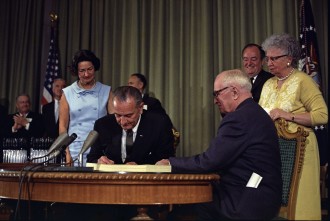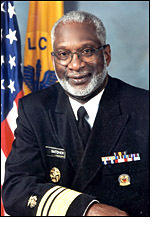When signing the bill creating Medicare and Medicaid 50 years ago, President Lyndon B. Johnson held the ceremony in Independence, Missouri, where former President Harry Truman lived.
Truman, who had pushed unsuccessfully for national health insurance during his own presidency, was at LBJ’s side during the signing. (And in one of those of odd coincidences of U.S. political history, the two presidents from different eras would die less than a month apart in the early 1970s.)
The decades-long push to create the two health insurance programs was like “a long-distance run,’’ said Dr. David Satcher, a former U.S. surgeon general, at a Carter Center forum Wednesday.
Satcher added that it was also “like a relay race,’’ noting that Truman handed off the “baton’’ of national insurance to LBJ.
This week, federal officials along with many health care and community organizations are marking the 50th anniversary of Medicare and Medicaid, created July 30, 1965.
Renard Murray, regional administrator of the federal Centers for Medicare and Medicaid Services, said both programs are “growing phenomenally.”
Medicare, the program for people 65 and older, now covers 1.5 million Georgians, and 55 million Americans overall. Medicaid, for the poor and disabled, has an even bigger reach, covering 69 million, including more than 1.8 million in Georgia.
When Johnson signed the legislation, roughly half of Americans 65 and older had no health insurance, the Associated Press reported. “No longer will older Americans be denied the healing miracle of modern medicine,” Johnson declared at the bill signing.
Satcher, 74, director of the Satcher Health Leadership Institute at Morehouse School of Medicine, gave a historical perspective of the programs at the Atlanta forum.
He said the programs gave “dignity’’ to older Americans and the poor so they could access medical care.
Medicare and Medicaid were passed during the same era as civil rights laws that ended official racial segregation. Satcher noted that with the advent of these programs, hospitals were no longer able to discriminate against black physicians.
He told the story of how when he was 2 years old in Alabama, he grew very ill with whooping cough and pneumonia. The black physician who came to his home, Satcher said, was at the time unable to propose hospitalization because he lacked hospital admitting privileges.
A recent Kaiser Family Foundation poll found that most Americans consider Medicare (77%) and Medicaid (63%) to be very important programs, with some differences in support based on respondents’ political affiliations.
Strong majorities among Democrats (89%), Republicans (69%) and independents (72%) view Medicare as very important. When it comes to Medicaid, the numbers are not quite so solid, but most Democrats (78%) and independents (62%) say it is very important, while almost half of Republicans (47%) say so.
The survey shows Medicaid has a broad reach, as nearly two-thirds (64%) of the public report a personal connection to the program, either because they are or have been covered or have close friends or family members who are or have been covered.
Changes and controversies
Medicaid presents annual budget challenges for states. But its importance in Georgia is underscored by the fact that it covers most childbirths in the state and most nursing home residents.
Not everyone is a fan of Medicare and Medicaid and how they currently operate.
The Heritage Foundation said Wednesday that the programs limit choice; are overly bureaucratic; have gaps in coverage and inefficient pricing; and are plagued with losses through waste, fraud and abuse. The group advocates giving patients direct control over the flow of health care dollars and compelling health plans and medical providers to compete for patients’ business “on a level playing field.”
Yet the Centers for Medicare and Medicaid Services has led the movement toward changing the payment systems for hospitals, doctors and other health care providers.
The agency plans to significantly change the way it reimburses Medicare providers, moving to base its payments less on the volume of specific services given to patients, and more on the quality of care delivered.
Under the Affordable Care Act, proposed by President Barack Obama and passed by Congress in 2010, Medicare has also begun giving bonuses and penalties to hospitals based on quality measures, such as readmission, infection and patient satisfaction rates.
Dr. Valerie Montgomery Rice, president of the Morehouse School of Medicine, told the Carter Center forum that the Medicare and Medicaid programs amounted to “really a game-changer to individuals and to communities.”
The programs have played a role in reducing health disparities, Montgomery Rice said.
Morehouse is committed to diversifying the health care workforce, she said. But she added that there currently is a major shortage of black males in U.S. medical schools.
She said targeted education programs can help African-American males realize the importance of math and science and help prepare them to succeed in high school, college and beyond.



